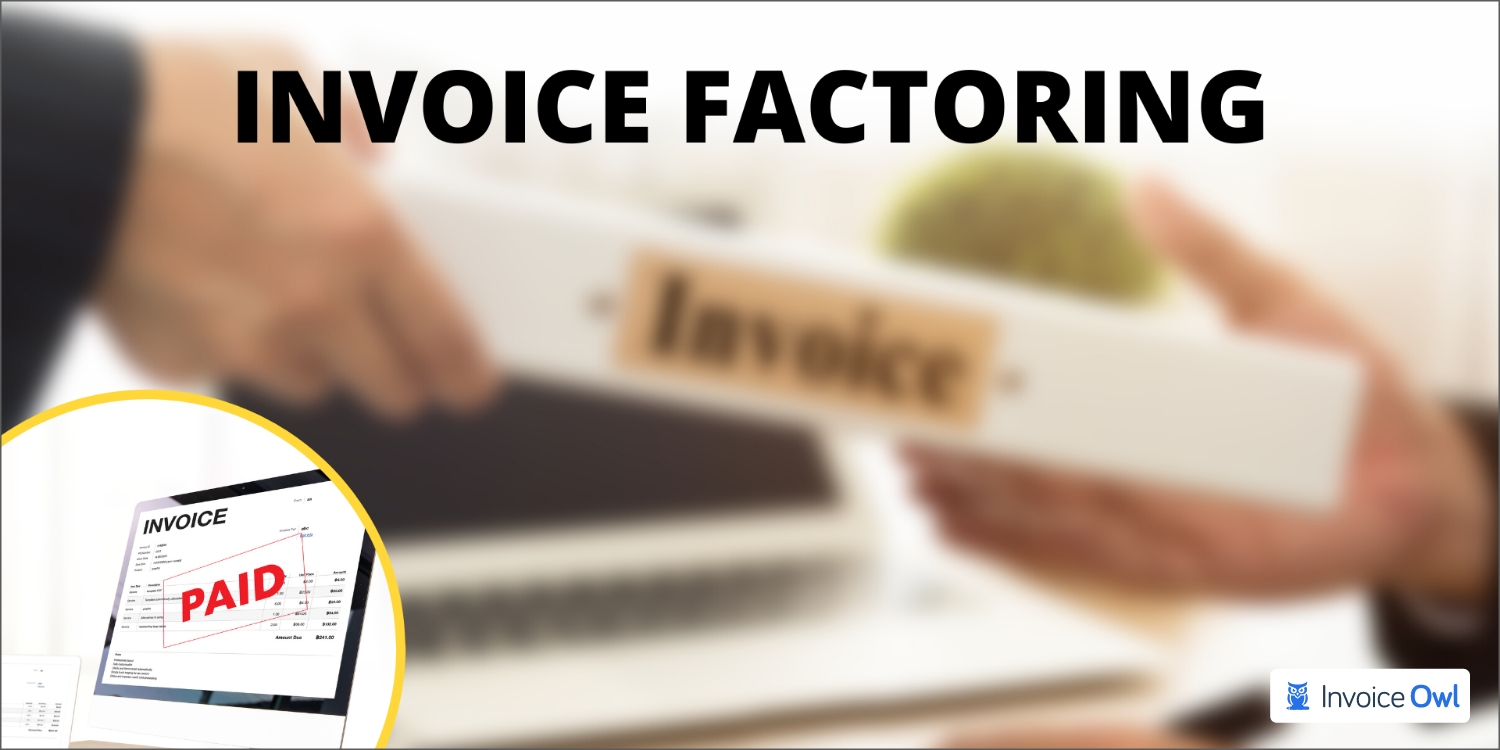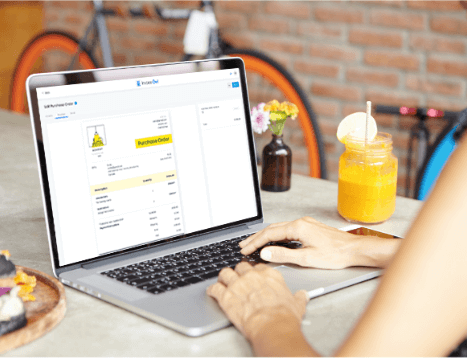Running your entrepreneurship is not an easy task, even when you do everything right. Especially, this gets difficult when you have to wait for clients to pay necessary invoices while your bills and payroll need immediate attention.
Sounds familiar, doesn’t it?
As a small business owner, having a gap in the cash flow soon turns into a nightmare. Failing to address it can disrupt basic operational activities such as salaries, utilities, and inventory.
This is where you say hello to invoice factoring.
In this guide, you will learn what invoice factoring means for businesses, how it works, and its advantages and disadvantages.
Table of Content
What is Invoice Factoring?
The invoice factoring is a type of short term financing process when a business owner sells invoices to an invoice factoring company in exchange for an advance of cash. On average, the invoices are payable in 60-90 days. This means that you can expect to not receive the payment for your services for at least a month after the invoice is sent to your client (if not longer).
Does that mean your business can stop operations? No. At this point, businesses turn to invoice factoring as a way to address these challenges and keep operational processes smooth. This process prevents small businesses from facing a money crunch.
Real-world examples
Let’s take an example of how the factoring company process works regarding unpaid invoices.
Background
- Business owner: Denila, a small business owner.
- Invoice details: $20,000 with a 30-day payment term.
- Challenge: The entire amount of her invoice was supposed to be paid by her customer three days before the deadline. In the meantime, her supplier was offering a discount if she ordered raw materials in bulk, but the offer was only available for a limited time, so she decided to take advantage of it while she waited for the customer to pay.
Problem
- Issue: Denila couldn’t avail the discount due to a lack of funds while waiting for her customer to pay.
- Impact: Her cash flow and expenses were affected.
Solution: Invoice factoring
Denila decided to approach an invoice factoring company to resolve her cash flow issues. Here’s how the process worked:
- Invoice submission: She submitted her $20,000 invoice to the factoring company.
- Advance payment: The company provided an advance of 80%, which amounted to $16,000.
- Service fee deduction: The factoring company charged a 4% fee (i.e., $800) on the remaining amount.
Outcome
- Total received: Denila received a total of $19,200.
- Benefit: She did not have to wait for her customer’s payment and could immediately take advantage of the supplier discount.
Now let’s check out some of the benefits of invoicing factoring.
The Benefits of Invoice Factoring
Invoice factoring can be advantageous for small companies. How?
You’re about to find out.
Key advantages
A business may consider an invoice factoring company for various reasons. The following are five of the most important:
Invoices factored by third parties are typically paid within a few days or 24 hours by third-party factors. In particular, smaller companies can benefit from timely cash flow by feeling more confident about covering near-term expenses.
A slow-paying customer and one with overdue bills can cause many headaches for a small business, especially in the case of late payments.
A late invoice may require the owner to spend additional time focusing on other customers or higher-value activities instead of dealing with the late invoice.
Trying to collect the payment of outstanding invoices can harm the morale of an accounts receivable department if they are responsible for collections.
To maintain the cash flow, bank loans and lines of credit are reasonable options. It can take time for small businesses to get them; for many, their levels may limit their ability to grow. A factoring company allows you to receive cash faster than a bank because of how the arrangement works.
The founder’s credit score often determines the availability of bank loans. Small-business owners often face this dilemma, mainly if they use their credit cards heavily for funding.
Invoice factoring is more interested in the credit rating of the company whose invoices it purchases than in the credit rating of the company that has placed the order.
Small businesses may find it challenging to meet the payment schedules of some vast and otherwise reliable clients.
Payment timing issues could complicate an order from a government agency or Fortune 500 company that could significantly impact their fortunes. These new orders may be fulfilled through invoice factoring work.
Common Pitfalls in Invoice Factoring
It is also essential for businesses to consider the downsides of factoring before selling invoices to a third party. There are several disadvantages to this method:
1. Considerable commitment needed
“Spot factoring,” which refers to factoring a single invoice, is sometimes offered by factoring companies. It is far more common for factoring companies to work only with companies that are willing to make the majority of their invoices available for factoring. It is common to establish a contractual minimum, and if invoices don’t meet it, a fee is charged.
2. Associated costs
Unlike bank loans, invoice factoring costs are based partly on perceived risk, but credit ratings are made by customers, not a company’s owner.
As a general rule, invoice factoring costs are generally several percentage points higher than the interest a business would pay on a bank loan, even when we are concerned that the risk of nonpayment is low.
3. Risk-retention
An earlier cash receipt can benefit a company, but it doesn’t guarantee protection against nonpayment by customers. Factors usually advance cash to the selling company if an invoice fails to pay unless a “non-recourse” clause exists. It increases the cost of the arrangement, however, by including this clause.
4. Impact on customer relations
Factoring arrangements usually ensure that invoices are paid. Worrying about this is a benefit of factoring for companies selling invoices. As a result, the company becomes less able to handle collection requests.
The perception of a company it purchased from could be negatively affected by an aggressive factor focused on its own short-term needs.
As a result of the presence of a factor, customers may believe that the company lacks the necessary resources to conduct business.
It is possible to manage these downsides. The factor can represent itself as part of the company’s financing department, for instance, via confidential factoring.
How Invoice Factoring Works
After researching invoice factoring as an option, it’s essential to consider the complete invoice factoring cycle to make an informed decision about whether an invoice factoring service is truly the best option for your business.
There are several ways in which invoice factoring works, but you should invoice your customers immediately after they have paid for the goods or services. Factoring companies, such as Riviera Finance and RTS Financial, have set parameters that small and medium businesses must comply. Below are the following processes:
Step-by-step process of invoice factoring
Check out the invoice factoring process in detail:
1. Initial inquiry
During the initial contact, we will establish whether you are a good candidate for accounts receivable funding.
2. Documentation submission
The next steps are to provide the requested documentation and fill out an application form. Throughout the process, your current and aging accounts receivables are the most critical documentation.
You must verify your clients’ creditworthiness with your factoring company before they can pay your invoices on time. Your factor will give you a better rate if you have an excellent payment history.
Your customers must show a prompt payment history rather than your credit score. If you do not have perfect credit, don’t let that deter you from applying. A traditional invoice factoring process can only consider invoices for already delivered goods or services.
There will be a need for the factor to verify receipt of the goods or services. Regarding factoring, extended payment terms of more than 90 days may also pose a problem.
3. Verification procedures
Your factor will require documents verifying the legitimacy of your company. They must confirm your registration with the appropriate government agencies to prevent fraud from occurring. There may be issues with late tax payments, outdated books, or liens attached to accounts receivable that prevent you from qualifying.
4. Factoring company engagement
Once all the documents are produced and risks are considered, an underwriting team member from your accounts receivable financing company will contact you.
Invoice factoring companies usually offer 70 – 90% of invoice value depending on the risk they believe they are taking by advancing money.
The amount of risk will also determine your rate. During this process, you can seek advice and support from a company specializing in invoice factoring.
5. Final commitment and funding
Once your customer has signed a contract and the factor has accepted the invoice, they will advance you the stated percentage, with the remaining payment going to you once your customer has paid according to their terms.
Your customers will pay the factor.
Many factors can make you nervous about a third party handling your payment.
Still, you should thoroughly discuss the process with the third party to make sure that you are assured that the collection process will be handled professionally.
After your factoring agreement is in place and your customers continue to pay promptly, the process can be repeated repeatedly, maximizing your cash flow and growing your business.
To make the invoicing process easier for your outstanding invoices, consider turning to InvoiceoOwl.
Costs Associated with Invoice Factoring
While invoice factoring is a great way to maintain a steady cash flow, it comes with its own set of additional costs. These include:
Discount fees
Discount fees include the percentage deducted from the invoice value by the factoring company. On average, these fees would include 1% to 5% of the overall amount. It ultimately depends on factors such as the client’s creditworthiness, invoice size, and industry. The fee structure is tiered and increases with each day that the invoice remains unpaid.
Service charges
Service charges are additional fees charged by invoice factoring companies. They are charged to cover operational expenses such as invoice processing, credit checks, and payment collections. These charges are either fixed or based on a percentage of the invoice value, typically ranging from 0.5% to 3%.
Invoice Factoring Compared to Other Financing Options
Even though many small business loans are available and alternative financing options, many of them might not be the best option for all businesses.
Depending on the lender, a credit score or an operating history may be required to qualify.
As for others, some of them can be fast and easy, but they can also be expensive and predatory.
Your goal is to find a type of small business lending that provides a solution to your needs at a cost that is reasonable and manageable for you.
Versus accounts receivable financing
Factoring invoices and financing accounts receivables differ primarily in the underwriting criteria. There is more flexibility with factoring but stricter credit requirements with A/R financing. Therefore, funding A/R is typically more favorable than other types of funding.
Factoring invoices and financing accounts receivables benefit businesses by providing them with funds before collection. Both financing options put money into your business quickly, which means they are a good choice when working capital is a critical component of your business operations.
Both offer receivables management and credit services, and factoring and A/R financing are both provided by many providers.
Versus invoice financing
Regarding invoice factoring versus invoice financing, the main difference is who collects the funds after the invoice is issued. When you finance invoices, you keep control of the collection process.
On the other hand, factory companies are responsible for collecting the purchased invoices. In most respects, both forms of financing are nearly identical, except for the collection process (i.e., assignment).
Versus invoice discounting
Factoring and discounting invoices are often mistaken for the same thing. Despite their similarities, they differ in some crucial ways. As a general rule, factoring and invoice discounting are transparent processes.
Core differences explained
| Factors | Invoice factoring | Accounts receivable financing | Invoice financing | Invoice discounting |
|---|---|---|---|---|
| Ownership of invoices | Factoring company collects payment | Business has the ownership of invoices | Business has the ownership of invoices | Business has the ownership of invoices |
| Collection responsibility | Manages customer payment collection | Business handles collections | Business handles collections | Business handles collections |
| Funding basis | Advance on the total invoice value | Loan or credit line secured by receivables | Advance against specific invoices | Discounted value provided for invoices upfront |
| Fee structure | Discount fees and service charges | Takes interest on the loan amount | Interest and fees on the financed amount | Discount fee deducted from invoice value |
Identifying the Need for Invoice Factoring
Regardless of the size of your business, you need to understand the situations where factoring fits can help you stabilize finances and fuel growth.
Let’s understand the factors that help you know the need for invoice factoring:
Target audience and use cases
Invoice factoring is ideal for businesses with consistent receivables but delayed payments. If you are a small business that lacks the credit history to secure loans, you can opt for invoice factoring instead.
You can also go for it if you’re a seasonal business like retail or construction that needs cash to cover operational expenses in peak periods. There are certain use cases where invoice factoring is popular, such as funding payroll, purchasing inventory, or maintaining cash flow in a specific time frame.
Invoice factoring vs. loans: Which is better?
While loans provide a lump sum repayable over time with interest, invoice factoring offers immediate cash ties to receivables. So, unlike loans, factoring doesn’t create long-term debt, making it appealing for businesses to avoid financial liabilities.
However, you should opt for loans if you have a long-term project that requires substantial capital. It is perfect if you need predictable repayment terms and larger amounts for expansion. The choice usually depends on the urgency of cash flow and financial strategy.
Conclusion and Next Steps
There are many reasons why a factoring company is an excellent choice for small business owners. One reason is that factoring companies take over your collection responsibilities, meaning you have more time to focus on your business.
In case you are experiencing a problem with collections, you not only have customers who don’t pay on time but also cannot deal with it on your own. Here factoring company may be an option since it puts that responsibility on a third party with experience in collection work.
Start Your eInvoicing Journey With InvoiceOwl
Create estimates and invoices with pre-designed templates to save time and our efforts!
Start Your FREE Trial
Frequently Asked Questions
-
How do invoice financing and factoring differ?
Invoice financing and factoring allow businesses to collect payments upfront without waiting for client payments. While invoice factoring creates a relationship between the lender and the client, invoice financing creates a relationship between the business and the lender.
-
Who needs invoice factoring?
Invoice factoring involves the funder managing a business’s collections and ledgers. When invoices are sent out, most are discounted, giving them more control. Small businesses with little credit control typically use it.
-
Is invoice factoring considered a loan?
Factoring invoices is not technically a loan. An invoice factoring company pays you in cash for your invoice at a discount. Upon receiving the invoices, the factoring company owns them and gets paid when it receives payment from your customers, typically between 30 and 90 days after the invoice was created.
-
Is factoring invoices a good idea?
A factoring invoice is a good idea for businesses that specifically need immediate cash so as not to miss some lucrative offer or some other business opportunity. This is particularly beneficial for those industries that function in long-term payments. But remember, there is a cost involved that can impact on your profit margin.
-
How much does it cost to factor invoices?
The cost of invoice factoring varies across the United States. Surely, it does include a factoring fee ranging from 1% to 5% of the invoice amount. Also, there are additional charges like setup or transfer fees. Mostly, factoring companies usually provide an advance of 80% to 90% of the invoice value upfront. Meanwhile, the remaining balance is paid after deducting fees once the customer settles the invoice.
-
What are the disadvantages of invoice factoring?
The primary disadvantage of invoice factoring is that it simply reduces profits for your business. In addition, it has been observed that it impacts customer relationships if the factoring company handles collections unprofessionally.
 By
By 

